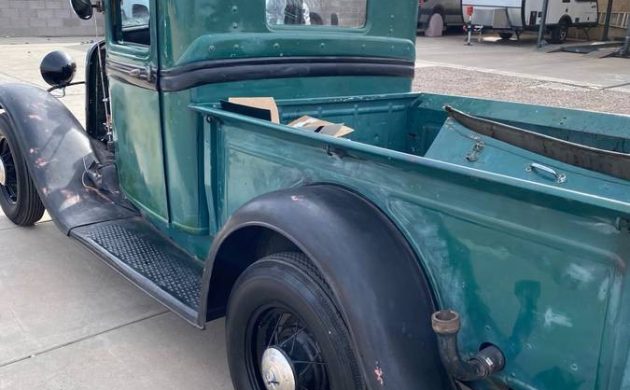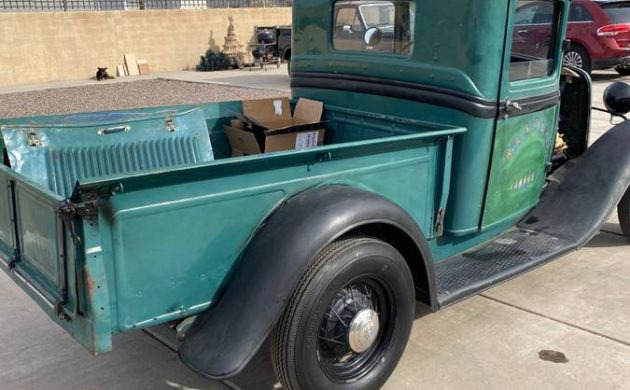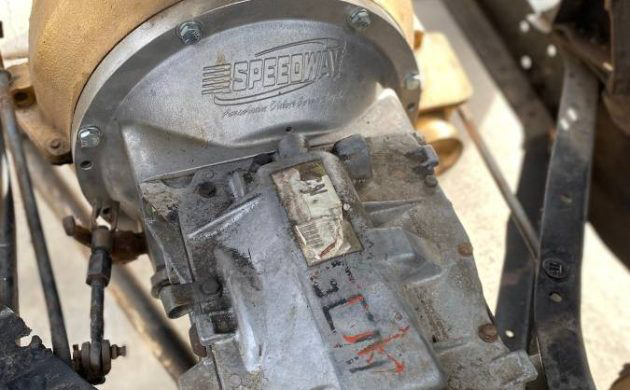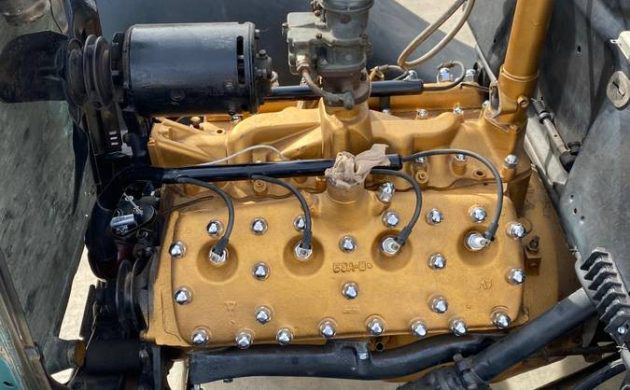It has been said that our hobbies keep us sane. For many of us sane is a relative term, but I think we all understand the importance of having fun when completing our projects. However, what happens when you can’t take that special project across the finish line? One person is working through this right now with a prewar truck project. This 1934 Ford pickup for sale on Craigslist in Mesa, Arizona is a project that the seller is, for undisclosed reasons, unable to complete. It is also at that sweet spot where a lot of work has been done and parts purchased, but it isn’t together enough to stop prospective buyers from making it their own. Would you be willing to take on someone’s incomplete pickup project for a perfectly reasonable $11,900? Thank you once again to T.J. for the tremendous, if unfinished tip!
This 1934 Ford pickup is in kind of a happy place between a stock truck, a period hot rod, and a classic vehicle with modern additions. The body is 100% Henry steel and straight as an arrow. The engine is a later Flathead V-8 painted a gaudy gold color, and that engine uses a Speedway Motors adapter to hook up to a five-speed manual transmission. That transmission’s original home is not disclosed, but most of these came out of Chevrolet S-10 pickups. From there it goes to an open drive rear end.
The truck has also been updated to later Ford hydraulic brakes. Attached to those brake drums looks to be a set of 1935 Ford wire wheels. There is no mention of the adapters needed when these wheels are attached to 1939 or later Ford drums, but it is a fairly important detail to attend to before hitting the highway. We are also told that a fresh set of tires have been installed as well.
The picture above shows the back of the 1938-1948 239 cubic inch Flathead with the bell housing cast with the engine block. The Speedway adaptor bolts right on and allows you five forward speeds instead of the original three. Of particular importance is the fifth gear, which would allow you to greatly reduce engine RPMs at highway speeds. This not only preserves a little bit of the hearing you have left, but it also helps to not beat the engine up so badly. Remember, the top speed of a Ford car in 1935 was 85 MPH, and 99% of the road conditions you would encounter back then made that speed unrealistic.
There is no word from the seller as to why the aforementioned Flathead was spray-painted gold. This, for some reason, included the intake manifold. The chrome acorn head bolts are a nice touch though. While this is not the correct engine for a 1934 truck, which would have 21 studs and water pumps at the front of the heads, it is a perfectly acceptable substitute. Blocks built before the LB insert bearing blocks introduced in 1936 still had Babbit bearings and a reputation for overheating. Seeing a later engine in a 1934 truck would be fairly common. Everything else on the engine is period correct from the generator to the carburetor. The wiring block on the firewall does stick out though.
Before you grab a plane ticket to pick up this truck, some important parts are not installed yet. It currently needs wiring, a driveshaft installed, and it has a new fuel tank that may already be bolted in if picture two above is any indication. There were no pictures of the interior and no detailed list of what else needed to be worked through. From where it is now you could finish it out however you want, or whenever for that matter.
So how would you finish this one out? Please share how you would proceed in the comments.








Get it home somehow, finish the job to make it safely roadworthy and drive it. I’m sure Geomechs or Howard can tell us how enthusiastically one could drive it safely but regardless drive it for cryin out loud! I’ll bet it smiles as much as the new owner does as they’re scooting down the byways..
My truck! My ’34 was my sole transportation and I drove it everywhere I needed to go. The V8 cruised at 60 with ease and overall it was a lot of fun. BTW, the Ford wheel bolt pattern didn’t change with the hydraulic brakes and I was very happy to have them on my truck. Really nice truck here.
https://www.earlyfordstore.com/collections/1935-1936-ford-car/products/hydraulic-brakes-wire-wheel-adapter-rings-set-of-4
The 1935 wheels and later drums do not mesh perfectly. Ask me how I know…
Please take the rag out of the gas tank filler. I know it is a new tank but the rag screams either “light me” or “oops!”. Missing filler cap? Take a couple of wraps with Saran Wrap and a rubber band around the neck to hold it on.
Last year I spent 2 hours fishing filthy old rag out of a Packard 120’s fuel tank.
Sigh,,,they were so close. Wasn’t in the cards. This is about the best conversion you could hope for. Personally, if the Flattie was retained, a 3 speed and Columbia O/D, making 6 forward gears( and 2 reverse) and would seem a lot simpler. Naturally, my stance is, for max exposure, it should have an automatic. I’m not sure a flathead V8 could accept that, and a whole new drivetrain would be in order. As is, while this setup could easily see 3 digits I bet, you’d be a fool to do so. It would just be a sweet ride at 55. You can’t alter it too much and still retain the original charm, the bilders intent, I’m sure..
A company called Flat O Matic in Oregon makes an aluminium adapter to mount a Ford 3 speed automatic on these old Flatheads. Perfect for a guy like me with only one leg. Here’s my Merc 255 Flattie
Howard, I had this exact set up in my 34 Coupe for several years, it works extremely well. My Fathead was modified 286 cu. in. and lots of speed equipment ,so it had a little extra, but I have seen the set up with stock motors and it works fine. I am sorry but your Columbia comparison is not a good one not even close. I have had both and the S-10 is simpler and much less money, by far the best choice. I now have a SBC in place of the Flathead and it works great with the 5 speed. I have also driven a Flathead with an automatic I like the 5 speed better ,but the automatic is OK. I could run a smooth 75 on the highway with no trouble. I have had several early Fords with stock transmissions, the popular 39 floor shifts and later 3 speed column shifts. They all have pros and cons, but the 5 speed is by far the best. As for this truck I think it is a decent buy It wouldn’t be too much work to complete. As for the Gold a lot of engine builders use to use colors like that.
Thanks Joe, well, the S10 dealybob may be the hot setup for today, but I’m a purist, and the Columbia 2 speed was the best choice of hot rodders then. These weighed just over a ton, so the V8 had enough grunt, 3 speed was adequate, and period correct. The 2 speed rear was more for passenger cars, as these were never meant to go speeds a 5 speed or 2 speed rear would deliver. Sorry, Joe, I’ve driven some dangerous machines, but about 45 was about all this truck was meant to go.
Cool find, I just got one myself, sits on a 1980 Toyota truck chassis and drivelline, have yet to drive it though. Seems like this is a good buy.
I would love to see this at my place. I’d take the overdrive and all, even though you don’t need it; they could cruise at 55-60 with very few problems. You really didn’t want to take them much faster as they just weren’t designed to go that fast. Myself, I wouldn’t be in a hurry to get to my destination anyways. I might add that I’m getting used to that import SUV jockey single-digit wave.
Interesting that the engine is painted gold. It’s reminiscent of the Sears Rebuilt units that were sold throughout the 60s. A lot of trucks out west sported gold engines. Regardless of the color, the 59AB was a good engine. Still had a tendency to overheat but it did the job…
There are a lot worse ways you could spend $12K on a project. And I have a weakness for truly useful classics. Done right this would be a great show piece and a truck for the occasional light run to Lowes or Depot.
Sorry Howard, I don’t agree, but its always fun if we were in the same room I don’t know if either one of us would be able to get a word in edgewise. BUTT, I have to say I have had more Flathead cars than some people have even seen. I am 80 years old and I got the first one when I was 19 ,still have the car. I have had 32’s, 34, 35 and 36’s several 40’s and 49 thru 53 cars and trucks and my opinion is you are simply wrong, SORRY!
As for the Columbia was not used much by Hot Rodder’s much, too expensive too much trouble, somewhat problematic, didn’t work for a speed contest. It has always been popular with the restorers and still is. Most early Fords had 4:11 rear ends, many changed to a higher rear end if they could find one, the movers and shakers (money guys) ran a quick change.
Seriously Howard I love many of your responses, but some times I think you might be speaking from bench racing and not time in the seat.
Posting deleted.
Must be sold. No longer listed.
Geomechs, They really didn’t have a tendency to overheat! Ford used them for over 20 years , do you think they all overheated? The ones that overheated had been modified, too much ignition, too much fuel and too many cubic in, all things young Hot Rodder’s did and they wondered why they overheated? The exhaust port design was not good, but it worked if you didn’t mess with everything else. But,no self respective Hot Rodder is going to do that, I know I wouldn’t .
You’re right, flatheads didn’t chronically overheat but I did run some in big trucks over the years where they sometimes pushed the limits. Some guys said to pull the thermostats but I found that they were actually cooler with a set of 160s in them. My ’47 pickup could push that last bar in the gauge when the temp got into the 90s but if I was in a place where I had to stop and leave the engine running, I took the advice of a truck driver. He said to run it at a fast idle and open the hood. It was amazing just letting the heat go somewhere…
Geomechs, Flathead’s didn’t have a tendency to overheat until all the young Hot Rodder’s discovered them and did all this cool stuff to them. )No pun intended.) well maybe, ie: More ignition, lots of fuel, big bore thin cylinder walls, high compression heads, what did they think might happen in less than ideal conditions? Yes the exhaust port design is not the best ,also running them 50,000 miles doesn’t help. But man were they fun, I loved them.
Having just build a 35 – which this truck has a 35 hood.. I was interested to see the rear suspension. Converting from a torque tube to open drive requires dealing with the torque/rotation of the rear axle. The original trailing arms are NOT strong enough to handle any torque beyond sitting still!
Alas, the listing has been removed!
I was curious about that.
Any idea what the conversion process is?
Gone!
Wow.
When priced right things just do not last on cl. Gone in a heartbeat practically.
The guy told me he took it off market may sell it later.hes going to do some more work a n little higher money..
Interesting. Increases the back story mystery.
Nice truck.
I put the line about Flatheads overheating in the story because I am rather familiar with them, considering I have a 1935 Ford. I should have been more specific about the earlier 21 stud engines, but I have heard of Flatheads of all years overheating for various reasons, most being (as stated by other commenters) improper maintenance and tuning. Another being cracks in the block allowing exhaust gases into the coolant passages.
The 21 studs had this overheating problem not only because of the sand used in the castings clogging up passages on occasion, but also the way the water pumps were designed. Bolted to the front of the heads, they were rather inefficient. One reason I heard was that they draw water from the heads to the radiator. With any cavitation or boiling their ability to draw water is greatly diminished, setting off a chain reaction that only got worse as the car got hotter. Ford chased these problems by doing things like introducing aluminum heads, hoping that the aluminum would dissipate heat better. They wouldn’t have gone to the expense of aluminum had they not thought it was worth the effort. Aluminum wasn’t nearly as common then and had its own share of issues with impurities in the metal.
The 21 stud didn’t last long, and each Flathead was better in the cooling department. Also remember that people didn’t drive as fast in the early thirties as they did later when the roads got better. More strain on these older Flatheads meant it was harder to keep them cool.
If anyone wants a college education on Flathead water pumps, I suggest they call or write Skip Haney in Punta Gorda, Florida. He has been rebuilding them for decades and is an absolute genius at making them as perfect as possible. https://skipscoilsandpumps.com/
Jeff, all your comments are dead nuts on. It just proves there are a lot of reasons flatheads had heating problems to some degree, but not as bad as many claim. Remember too we are talking about years ago and as time went on many advancements were made.